MUSIC TO BE SEEN, HEARD AND FELT – - Rundfunkchor Berlin
MUSIC TO BE SEEN, HEARD AND FELT – - Rundfunkchor Berlin
MUSIC TO BE SEEN, HEARD AND FELT – - Rundfunkchor Berlin
You also want an ePaper? Increase the reach of your titles
YUMPU automatically turns print PDFs into web optimized ePapers that Google loves.
POLY<br />
VOKANT<br />
WINNER GRAMMY AWARD 2008 <strong>AND</strong> 2009 FEBRUARY MARCH APRIL 2010<br />
FEATURE S<strong>TO</strong>RY<br />
<strong>MUSIC</strong> <strong>TO</strong><br />
<strong>BE</strong> <strong>SEEN</strong>,<br />
<strong>HEARD</strong><br />
<strong>AND</strong> <strong>FELT</strong><br />
<strong>–</strong><br />
SAVITRI WITH RUNDFUNKCHOR <strong>BE</strong>RLIN<br />
<strong>AND</strong> THE CON<strong>TO</strong>RTIONISTS OF<br />
“SCHLANGENMENSCHEN” <strong>–</strong><br />
LARS SCHEIBNER STAGES GUSTAV HOLST<br />
AT THE TECHNO CLUB <strong>BE</strong>RGHAIN<br />
<strong>Rundfunkchor</strong> <strong>Berlin</strong> returns to Europe’s hippest techno<br />
club with Gustav Holst’s chamber opera Savitri. In 2009<br />
the British techno magazine DJ Mag named Berghain<br />
the best techno club in the world. The chorus first<br />
appeared a year ago in this huge mecca to hardcore<br />
hedonism situated behind the Ostbahnhof: and in the<br />
imposing rooms of the former power plant, it succeeded<br />
in turning on a whole new audience to its music.<br />
For the <strong>Berlin</strong> choreographer Lars Scheibner, Berghain is<br />
now the place in <strong>Berlin</strong> for experiencing phenomena<br />
like crossing boundaries, ecstasy and transcendence.<br />
Savitri is the story of a woman who succeeds in conquering<br />
Death because she has seen through the veil<br />
of Māyā (the illusion of all existence). The English<br />
composer Gustav Holst (1874 <strong>–</strong> 1934), best know for his<br />
orchestral suite The Planets, derived the work from the<br />
Mahabharata, the Hindu epic retelling of the history of<br />
mankind, created over centuries. Holst learned Sanskrit<br />
in order to read the original text in the British Museum.<br />
For two decades he was obsessed with India, and during<br />
this time created several operas, choruses, songs and<br />
instrumental works (some still unperformed) on Indian<br />
subjects.<br />
In <strong>Rundfunkchor</strong> <strong>Berlin</strong>’s series Broadening the Scope<br />
of Choral Music, Lars Scheibner is working on Savitri<br />
with an international group of female contortionists.<br />
Just as the party scene with its own “temples” and<br />
rituals represents today’s venue of ecstasy, so the art of<br />
contortion symbolizes the human body’s transcendence<br />
of its natural limits. “For me”, declares Scheibner,<br />
“contortion is a visual symbol of the transcendence<br />
that Savitri dares to undergo by confronting Death.<br />
And she wins.” …
NEWS<br />
<strong>–</strong><br />
PHILHARMONIE <strong>BE</strong>RLIN<br />
FRI 26 FEBRUARY 2010, 8 PM<br />
SAT 27 FEBRUARY 2010, 8 PM<br />
COLOGNE, PHILHARMONIE<br />
MON 1 MARCH 2010, 8 PM<br />
INGO METZMACHER <strong>–</strong> CONDUC<strong>TO</strong>R<br />
Robert Schumann had a twofold talent<br />
for music and poetry. His admiration for<br />
Goethe’s Faust knew no bounds, and he<br />
long harboured a plan to set individual<br />
scenes from the tragedy. He began with<br />
the final scene, also composed by Mahler,<br />
and worked for nine years on the tragedy of<br />
Gretchen before reaching the keys scenes<br />
of Faust II. Thus, in a sense, we can follow<br />
Schumann’s development in reverse order<br />
in the Faust Scenes as well as his utopian<br />
vision of a German national art, which took<br />
a direction so different from Wagner’s. Ingo<br />
Metzmacher is devoting himself to the<br />
work as part of his “Germany” cycle.<br />
<strong>BE</strong>RLIN, PHILHARMONIE<br />
2010 SING-ALONG CONCERT<br />
SUN 7 FEBRUARY 2010, 4 PM<br />
INGO METZMACHER<br />
SING-ALONG CONCERT 2009<br />
All tickets for singing participants as well<br />
as for listeners have been sold. The waiting<br />
list is long. Following selections by Mozart,<br />
Orff, Brahms, Handel, Fauré, Verdi and Mendelssohn,<br />
Schubert’s Mass in A flat is on<br />
the programme for this year’s Sing-Along<br />
Concert. With some 1500 participants,<br />
this masterpiece of Classical balance and<br />
Romantic exuberance, which took Schubert<br />
longer to compose than any of his other<br />
works, is certain to receive a powerful performance.<br />
Continuation of feature story<br />
No connection is intended here between classical music<br />
and vaudeville. “We will move and choreograph our<br />
wonderful contortionists like dancers”, says Scheibner<br />
at once to prevent any possible misunderstanding.<br />
They are part of a dramaturgical concept that channels<br />
the energies of text, music and movement into a<br />
flowing, poetic life context.<br />
The space is also part of this context. The architecture<br />
on the ground floor recalls the stone forest of Karnak,<br />
A FLOWERING TREE,<br />
2006 STAGED BY PETER SELLERS<br />
EXISTENTIAL<br />
URGENCY<br />
<strong>–</strong><br />
PETER SELLARS LAUNCHES A WORK-IN-<br />
PROGRESS WITH BACH’S MATTHEW PASSION<br />
For Easter 2010, Peter Sellars and Sir Simon Rattle are<br />
preparing a staged concert version of Bach’s St.Matthew<br />
Passion with the <strong>Berlin</strong>er Philharmoniker and <strong>Rundfunkchor</strong><br />
<strong>Berlin</strong>. The American star director sees the project<br />
expressly as homage to <strong>Rundfunkchor</strong> <strong>Berlin</strong>.“After our<br />
performances of John Adams’s The Flower Tree, a number<br />
of individual members of the chorus came up to me<br />
as asked if we couldn’t continue working together. And<br />
I was also thinking about continuing the collaboration<br />
with them, because the power and emotionality that<br />
come from this ensemble are so strong.”The choice fell<br />
to Bach, because this time Sellars wanted to work on<br />
something outside the chorus’s own cultural circle.<br />
He makes one thing immediately clear: this won’t be a<br />
staging in the conventional sense of the word. There<br />
will be no special lighting, no costumes, and no set<br />
other than the concert hall.The hall itself is the setting:<br />
Sellars views concert attendance as a ritual, which in all<br />
its implication suggests a parallel to the ritual of church<br />
attendance. “My job is to work with the chorus on<br />
the text, on making the text understandable in order<br />
to intensify the communication between stage and<br />
audience. Some things will manifest themselves as<br />
physical movement, while others turn inward.” Sellars<br />
regards the performances as the first step in a longer<br />
work-in-progress. He hopes with the Matthew Passion<br />
thereby creating an association between antiquity,<br />
another bygone era <strong>–</strong> that of industrialization <strong>–</strong> and the<br />
present day. At the beginning of the evening, DJ’s and<br />
VJ’s (video jockeys) will transport the audience to an<br />
elevated state approaching trance, out of which Holst’s<br />
poetic vision of a woman’s wisdom can unfold.<br />
<strong>BE</strong>RLIN, <strong>BE</strong>RGHAIN<br />
MON 10 / TUES 11 MAY 2010, 10 PM<br />
(Admission at 9 pm)<br />
to be able to establish a long-term, increasingly active<br />
performance tradition in <strong>Berlin</strong>.<br />
His understanding of Bach is taken from real life. It was<br />
singers <strong>–</strong> who in 1980 invited the then 23-year-old director<br />
to create his first Handel stagings and with whom<br />
he created his legendary Mozart opera cycle <strong>–</strong> who introduced<br />
him to Bach. For nearly a decade he attended as<br />
regularly as possible the complete cycle of Bach cantatas<br />
given in Boston’s Emmanuel Church, one every Sunday.<br />
“The church has many social programmes: for the homeless,<br />
drug addicts, alcoholics, woman suffering from<br />
domestic abuse and fugitives. In its services I experienced<br />
how vital a significance Bach’s music can have<br />
for people in need.” Now he aims to recreate a sense of<br />
his experience of this existential urgency.<br />
SALZBURG, GROSSES FESTSPIELHAUS<br />
SUN 28 MARCH / SAT 3 APRIL 2010, 6.30 PM<br />
<strong>BE</strong>RLIN, PHILHARMONIE<br />
FRI 9 / SAT 10 / SUN 11 APRIL 2010, 7 PM
JOIN IN!<br />
<strong>–</strong><br />
IT’S ALL HAPPENING AT RUNDFUNKCHOR<br />
<strong>BE</strong>RLIN’S 4TH LIEDERBÖRSE<br />
Preparations for the next Liederbörse (Song Exchange)<br />
are in full swing. Seven <strong>Berlin</strong> secondary schools and a<br />
primary school are taking part in this year’s annual festival<br />
for school choirs, organized by the Radio Chorus. In<br />
addition, there will be two courses in performance art<br />
to ensure a Carnival atmosphere in the <strong>Berlin</strong> Philharmonie’s<br />
Chamber Music Hall. To mark the fifth anniversary,<br />
Gunter Berger has proclaimed 13 February 2010<br />
Carnevale mondiale at this gathering of <strong>Berlin</strong>’s singing<br />
youth and children from the age of ten upwards.<br />
The concert will be colourful <strong>–</strong> that much has already<br />
been determined. <strong>Rundfunkchor</strong> <strong>Berlin</strong> will set the tone<br />
with the title melody from Johann Strauss’s Night in<br />
Venice. The mother of all Carnival operettas was composed<br />
in Vienna, premiered in <strong>Berlin</strong> and set in Venice <strong>–</strong><br />
and is thus genuinely mondial. Then the children and<br />
young people will storm the halls in the guise of<br />
singing London street hawkers. A samba with everyone<br />
joining in will move the Carnival to Rio. The Hans<br />
A WARM<br />
WELCOME!<br />
<strong>–</strong><br />
<strong>TO</strong> NICOLAS FINK, NEW ASSISTANT<br />
AT RUNDFUNKCHOR <strong>BE</strong>RLIN<br />
<strong>Rundfunkchor</strong> <strong>Berlin</strong> has a new assistant. On 1 February<br />
2010, Nicolas Fink will succeed Sigurd Brauns, who<br />
retired on 31 October 2009. The young Berne conductor<br />
was noticed by Simon Halsey in 2005 at the Eric Ericson<br />
masterclass in Haarlem. In 2006 Halsey brought him<br />
to <strong>Berlin</strong> for Christian Jost’s Angst. Regular further<br />
invitations followed, including for Bernstein’s Third<br />
Symphony, John Adams’s Transmigration of Souls and<br />
Humperdinck’s Königskinder. On 24 January 2010 he will<br />
conduct the first of his own concerts with <strong>Rundfunkchor</strong><br />
<strong>Berlin</strong>.<br />
Fink studied choral conducting, singing and the duties<br />
of a choral répétiteur in Lucerne before become a con-<br />
Carossa Gymnasium will throw a party on the Caribbean.<br />
The Albert Einstein Oberschule will contribute a<br />
charivari, or noisy mock serenade, from Venice circa<br />
1600; <strong>Rundfunkchor</strong> <strong>Berlin</strong> will offer some “nonsense”<br />
from 20th-century Italy. France will be represented by a<br />
nightingale quodlibet, the Baltic by a satirical song of the<br />
Vepsians, an ancient Finnic people living between Lake<br />
Ladoga and Lake Onega in northwestern Russia. And<br />
from Germany will be heard the “nose” canon of Friedrich<br />
Kuhlau, who fled to Denmark during the Napoleonic<br />
Wars and was celebrated there, yet also wrote witty<br />
music for German Liedertafel (male singing circles).<br />
As part of the Liederbörse, the singers of <strong>Rundfunkchor</strong><br />
<strong>Berlin</strong> go out into the schools as tutors. At the concert<br />
itself, the audience can also sing along. A half hour<br />
before the concert starts, they will be given a brief rehearsal.<br />
<strong>BE</strong>RLIN, PHILHARMONIE<br />
SAT 13 FEBRUARY 2010, 3 PM<br />
LIEDERBÖRSE<br />
SING-ALONG-CONCERT FOR SCHOOLCHILDREN<br />
NICOLAS FINK<br />
ducting fellow at the Tanglewood Music Center under<br />
Bernard Haitink and James Levine. In Switzerland he<br />
directed many choirs of his own. He also took over rehearsals<br />
of the Hilversum (Netherlands) and WDR (West<br />
German) radio choruses. Most recently, he was assistant<br />
musical director of the Palladium Theatre in Stuttgart.<br />
KAMMERMUSIK-<br />
PODIUM<br />
<strong>–</strong><br />
TREP<strong>TO</strong>WER,<br />
ALLIANZ DEUTSCHL<strong>AND</strong> AG<br />
4TH KAMMERMUSIKPODIUM<br />
LOVE <strong>AND</strong> OTHER FLOWERS<br />
SUN 14 FEBRUARY 2010, 5 PM<br />
Traditional Jewish art is a permanent fixture<br />
of our cultural life today. One of the<br />
less well-known vocal forms of the Jewish<br />
musical tradition is the Sephardic art-song.<br />
Jörg Schneider and his fellow musicians will<br />
present some of the gems of the Spanish-<br />
Jewish vocal tradition.<br />
5TH KAMMERMUSIKPODIUM<br />
LORELEY <strong>AND</strong> OTHER BLONDES<br />
SUN 7 MARCH 2010, 5 PM<br />
The beloved four-part harmonists of the<br />
male quartet Vokalzeit just couldn’t resist.<br />
After the classics, folksongs and songs of<br />
the Freemasons, Italians and night owls,<br />
the ladies are now on as the ensemble celebrates<br />
International Women’s Day.Whether<br />
her name is Ruth, Gerda or Veronika, she’ll<br />
be lovingly serenaded in the style of the<br />
Comedian Harmonists.<br />
KRISTIINA MÄKIMATTILA<br />
6TH KAMMERMUSIKPODIUM<br />
FOLKSONGS<br />
SUN 18 APRIL 2010, 5 PM<br />
JÖRG SCHNEIDER<br />
VOKALZEIT<br />
In 1964 Luciano Berio gave a face-lift to a<br />
number of folksong from around the world<br />
in rather crazy instrumentation for his wife<br />
Cathy Berberian. 45 years later, Rain Schnös,<br />
<strong>Rundfunkchor</strong> <strong>Berlin</strong> bass, is continuing this<br />
experiment for Kristiina Mäkimattila with<br />
Brahms folksongs. On an afternoon in April,<br />
you’ll be able to experience both the original<br />
and the sequel.
CD’S<br />
<strong>–</strong><br />
HENZE’S NINTH SYMHONY UNDER<br />
JANOWSKI IN THE PRESS<br />
As part of his complete recording of the<br />
symphonies of Hans Werner Henze, conductor<br />
Marek Janowski now presents the<br />
Ninth Symphony in a performance by<br />
the Rundfunk-Sinfonieorchester <strong>Berlin</strong> and<br />
<strong>Rundfunkchor</strong> <strong>Berlin</strong>. This perhaps definitive<br />
recording, in superb studio quality, has<br />
met with unanimous praise.<br />
Overwhelmingly forceful,<br />
even in the delicate passages.<br />
Frankfurter Allgemeine Zeitung<br />
Brilliant recording<br />
<strong>Berlin</strong>er Zeitung<br />
Indeed, Chorus and Orchestra fuse into<br />
a super-instrumental body, the voices<br />
functioning like another section. In this<br />
new recording their tone and range seems,<br />
if anything, more refined and attuned<br />
to Henze’s searing textures. Highly<br />
recommended.<br />
Gramophone<br />
HENZE SYMPHONY NO. 9<br />
<strong>Rundfunkchor</strong> <strong>Berlin</strong> (Michael Gläser)<br />
Rundfunk-Sinfonieorchester <strong>Berlin</strong><br />
MAREK<br />
JANOWSKI<br />
Wergo<br />
WER 6722 2<br />
IMPRESSUM<br />
<strong>–</strong><br />
RUNDFUNKCHOR <strong>BE</strong>RLIN<br />
Charlottenstraße 56, 10117 <strong>Berlin</strong>, Germany<br />
CUS<strong>TO</strong>MER SERVICE<br />
Telefon +49 (0)30 - 20 29 87 22, Fax -29<br />
tickets@rundfunkchor-berlin.de<br />
MANAGEMENT<br />
Telefon +49 (0)30 - 20 29 87 560, Fax -569<br />
info@rundfunkchor-berlin.de<br />
www.rundfunkchor-berlin.de<br />
PRINCIPAL CONDUC<strong>TO</strong>R Simon Halsey<br />
MANAGING DIREC<strong>TO</strong>R Hans Rehberg<br />
TEXT Boris Kehrmann<br />
EDI<strong>TO</strong>RIAL Ilka Rößler-Gnauck<br />
LAYOUT tableau GmbH, <strong>Berlin</strong><br />
PHO<strong>TO</strong>S Lars Scheibner, Ruth Walz, Bettina<br />
Straub, Mathias Bothor, Matthias Heyde<br />
<strong>Rundfunkchor</strong> <strong>Berlin</strong> is an ensemble of<br />
Rundfunk Orchester und Chöre Gmbh,<br />
<strong>Berlin</strong>.<br />
GENERAL MANAGER Gernot Rehrl<br />
SHAREHOLDERS<br />
Deutschlandradio, the Federal Republic<br />
of Germany, the State of <strong>Berlin</strong>, Radio<br />
<strong>Berlin</strong>-Brandenburg<br />
CONCERTS 2. <strong>–</strong> 4. 2010<br />
<strong>–</strong><br />
<strong>BE</strong>RLIN, PHILHARMONIE<br />
2010 SING-ALONG CONCERT<br />
SUN 7 FEBRUARY 2010, 4 PM<br />
FRANZ SCHU<strong>BE</strong>RT<br />
MASS IN A FLAT MAJOR D678<br />
for soloists, chorus and orchestra<br />
Simone Nold <strong>–</strong> soprano<br />
Rebecca Martin <strong>–</strong> mezzo-soprano<br />
Markus Schäfer <strong>–</strong> tenor<br />
Konrad Jarnot <strong>–</strong> baritone<br />
RUNDFUNKCHOR <strong>BE</strong>RLIN<br />
GUESTS OF RUNDFUNKCHOR<br />
<strong>BE</strong>RLIN<br />
RUNDFUNK-<br />
SINFONIEORCHESTER <strong>BE</strong>RLIN<br />
DEUTSCHE<br />
STREICHERPHILHARMONIE<br />
SIMON HALSEY <strong>–</strong> CONDUC<strong>TO</strong>R<br />
_<br />
<strong>BE</strong>RLIN, PHILHARMONIE<br />
SAT 13 FEBRUARY 2010, 3 PM<br />
LIEDERBÖRSE<br />
(SONG EXCHANGE)<br />
SING-ALONG CONCERT<br />
FOR STUDENTS<br />
CARNEVALE MONDIALE<br />
CARNIVAL SONGS, MADRIGALS<br />
<strong>AND</strong> CHORUSES FROM ALL OVER<br />
THE WORLD<br />
STUDENTS FROM <strong>BE</strong>RLIN<br />
SCHOOLS<br />
Sigurd Brauns, Andre Julig <strong>–</strong> piano<br />
Uli Singer <strong>–</strong> guitar /charango<br />
Stefan Weiser <strong>–</strong> bass<br />
Udo Mack <strong>–</strong> percussion /drums<br />
RUNDFUNKCHOR <strong>BE</strong>RLIN<br />
GUNTER <strong>BE</strong>RGER <strong>–</strong> CONDUC<strong>TO</strong>R<br />
<strong>AND</strong> MODERA<strong>TO</strong>R<br />
_<br />
TREP<strong>TO</strong>WER, ALLIANZ<br />
DEUTSCHL<strong>AND</strong><br />
4TH KAMMERMUSIKPODIUM<br />
LOVE <strong>AND</strong> OTHER FLOWERS<br />
SUN 14 FEBRUARY 2010, 5 PM<br />
Music of the Sephardi Jews<br />
of the Mediterranean region and<br />
Ottoman Empire<br />
Christine Lichtenberg <strong>–</strong><br />
mezzo-soprano<br />
Judith Simonis <strong>–</strong> contralto<br />
Jörg Schneider <strong>–</strong> baritone, guitar<br />
INSTRUMENTALISTS FROM<br />
THE <strong>BE</strong>RLIN CONSERVA<strong>TO</strong>RY<br />
FOR TURKISH <strong>MUSIC</strong><br />
Nuri Karademirli <strong>–</strong> oud<br />
(short-necked lute)<br />
Serkan Kaynarcali <strong>–</strong> kanûn<br />
(trapeze zither)<br />
Dündar Atalay <strong>–</strong> ney (reed flute)<br />
Lorenz Masé <strong>–</strong> keman (violin)<br />
Senol Eyol <strong>–</strong> bendir, darbuka (drum)<br />
_<br />
<strong>BE</strong>RLIN, PHILHARMONIE<br />
FRI 26 FEBRUARY 2010, 8 PM<br />
SAT 27 FEBRUARY 2010, 8 PM<br />
COLOGNE, PHILHARMONIE<br />
MON 1 MARCH 2010, 8 PM<br />
RO<strong>BE</strong>RT SCHUMANN<br />
SCENES FROM GOETHE’S “FAUST”<br />
for solists, chorus and orchestra<br />
Christian Gerhaher <strong>–</strong> baritone (Faust)<br />
Camilla Nylund <strong>–</strong> soprano (Gretchen)<br />
Georg Zeppenfeld <strong>–</strong> bass<br />
(Mephistopheles)<br />
Mojca Erdmann <strong>–</strong> soprano<br />
Ingeborg Danz <strong>–</strong> mezzo-soprano<br />
Werner Güra <strong>–</strong> tenor<br />
STAATS- UND DOMCHOR <strong>BE</strong>RLIN<br />
KAI-UWE JIRKA<br />
RUNDFUNKCHOR <strong>BE</strong>RLIN<br />
STEFAN PARKMAN<br />
DEUTSCHES SYMPHONIE-<br />
ORCHESTER <strong>BE</strong>RLIN<br />
INGO METZMACHER <strong>–</strong><br />
CONDUC<strong>TO</strong>R<br />
_<br />
TREP<strong>TO</strong>WER, ALLIANZ<br />
DEUTSCHL<strong>AND</strong><br />
5TH KAMMERMUSIKPODIUM<br />
LORELEY <strong>AND</strong> OTHER BLONDES<br />
SUN 7 MARCH 2010, 5 PM<br />
Salon music and chansons in the<br />
style of the Comedian Harmonists<br />
VOKALZEIT <strong>–</strong> MALE QUARTET<br />
Jan Remmers <strong>–</strong> tenor<br />
Joachim Vogt <strong>–</strong> tenor<br />
Michael Timm <strong>–</strong> bass<br />
Oliver Gawlik <strong>–</strong> bass<br />
Philip Mayers <strong>–</strong> piano<br />
_<br />
SALZBURG, GROSSES<br />
FESTSPIELHAUS<br />
SALZBURG EASTER FESTIVAL<br />
SAT 27 MARCH 2010, 5 PM<br />
MON 5 APRIL 2010, 5 PM<br />
RICHARD WAGNER<br />
GÖTTERDÄMMERUNG<br />
Ben Heppner <strong>–</strong> tenor (Siegfried)<br />
Gerd Grochowski <strong>–</strong> baritone (Gunther)<br />
Mikhail Petrenko <strong>–</strong> bass (Hagen)<br />
Dale Duesing <strong>–</strong> bass (Alberich)<br />
Katarina Dalayman <strong>–</strong> soprano<br />
(Brünnhilde)<br />
Emma Vetter <strong>–</strong> soprano (Gutrune)<br />
Anne Sofie von Otter <strong>–</strong> mezzo-soprano<br />
(Waltraute)<br />
Anna Siminska <strong>–</strong> soprano (Woglinde)<br />
Eva Vogel <strong>–</strong> mezzo-soprano<br />
(Wellgunde)<br />
Maria Radner <strong>–</strong> contralto<br />
(Flosshilde, 1st Norn)<br />
Michaela Martens <strong>–</strong> mezzo-soprano<br />
(2nd Norn)<br />
Miranda Keyes <strong>–</strong> contralto (3rd Norn)<br />
Stéphane Braunschweig <strong>–</strong><br />
stage production and set design<br />
Thibauld Vancraenenbroeck <strong>–</strong><br />
costume design<br />
Marion Hewlett <strong>–</strong> lighting design<br />
RUNDFUNKCHOR <strong>BE</strong>RLIN<br />
SIMON HALSEY<br />
<strong>BE</strong>RLINER PHILHARMONIKER<br />
SIR SIMON RATTLE <strong>–</strong><br />
CONDUC<strong>TO</strong>R<br />
_<br />
SALZBURG, GROSSES<br />
FESTSPIELHAUS<br />
SUN 28 MARCH 2010, 6.30 PM<br />
SAT 3 APRIL 2010, 6.30 PM<br />
<strong>BE</strong>RLIN, PHILHARMONIE<br />
FRI 9 APRIL 2010, 7 PM<br />
SAT 10 APRIL 2010, 7 PM<br />
SUN 11 APRIL 2010, 7 PM<br />
JOHANN SEBASTIAN BACH<br />
ST. MATTHEW PASSION<br />
Mark Padmore <strong>–</strong> tenor (Evangelist)<br />
Camilla Tilling <strong>–</strong> soprano<br />
Magdalena Kozˇená <strong>–</strong> mezzo-soprano<br />
Topi Lehtipuu <strong>–</strong> tenor<br />
Christian Gerhaher <strong>–</strong> baritone<br />
Thomas Quasthoff <strong>–</strong> baritone<br />
Christina Bischoff <strong>–</strong> soprano<br />
Barbara Kind <strong>–</strong> soprano<br />
Isabelle Voßkühler <strong>–</strong> soprano<br />
Christine Lichtenberg<strong>–</strong>mezzo-soprano<br />
Holger Marks <strong>–</strong> tenor<br />
David Stingl <strong>–</strong> baritone<br />
Axel Scheidig <strong>–</strong> bass<br />
Peter Sellars <strong>–</strong> ritualization<br />
KNA<strong>BE</strong>N DES STAATS-<br />
UND DOMCHORES <strong>BE</strong>RLIN<br />
(<strong>BE</strong>RLIN ONLY)<br />
KAI-UWE JIRKA<br />
KNA<strong>BE</strong>NCHOR SALZBURG<br />
(SALZBURG ONLY)<br />
WOLFGANG GÖTZ<br />
RUNDFUNKCHOR <strong>BE</strong>RLIN<br />
SIMON HALSEY<br />
<strong>BE</strong>RLINER PHILHARMONIKER<br />
SIR SIMON RATTLE <strong>–</strong><br />
CONDUC<strong>TO</strong>R<br />
_<br />
TREP<strong>TO</strong>WER, ALLIANZ<br />
DEUTSCHL<strong>AND</strong><br />
6TH KAMMERMUSIKPODIUM<br />
FOLKSONGS<br />
SUN 18 APRIL 2010, 5 PM<br />
JOHANNES BRAHMS/<br />
RAINER SCHNÖS<br />
FOLKSONGS<br />
RAINER SCHNÖS (ARR.)<br />
SUOMALAISIA KANSANLAULUJA/<br />
FINNISH FOLKSONGS<br />
LUCIANO <strong>BE</strong>RIO<br />
FOLK SONGS<br />
Kristiina Mäkimattila<strong>–</strong>mezzo-soprano<br />
Aaron Dan <strong>–</strong> flute<br />
Bernhard Nusser <strong>–</strong> clarinet<br />
Wolfgang Hasleder <strong>–</strong> violin / viola<br />
Ithay Khen <strong>–</strong> cello<br />
Maria Todtenhaupt <strong>–</strong> harp<br />
Martin Krause, Benjamin Ulrich <strong>–</strong><br />
percussion<br />
Wolfgang Hasleder <strong>–</strong> direction<br />
_<br />
<strong>BE</strong>RLIN, <strong>BE</strong>RGHAIN<br />
MON 10 MAY 2010, 10 PM<br />
TUES 11 MAY 2010, 10 PM<br />
GUSTAV HOLST<br />
HYMNS FROM THE RIG VEDA<br />
SAVITRI (EPISODE FROM THE<br />
MAHABHARATA)<br />
Alba, Helena, Sabrina <strong>–</strong> contortion<br />
Susan Bickley <strong>–</strong> mezzo-soprano<br />
Christopher Gillett <strong>–</strong> tenor<br />
Konrad Jarnot <strong>–</strong> baritone<br />
Lars Scheibner <strong>–</strong> scenic adaptation /<br />
choreography<br />
Rico Heidler <strong>–</strong> staging / lighting design<br />
Änn <strong>–</strong> costumes<br />
Boris Kehrmann <strong>–</strong> dramaturgy<br />
Pfadfinderei design bureau <strong>–</strong> VJ<br />
David Canisius <strong>–</strong> DJ<br />
SIMON HALSEY <strong>–</strong> CONDUC<strong>TO</strong>R<br />
MEM<strong>BE</strong>RS OF THE RUNDFUNK-<br />
SINFONIEORCHESTER <strong>BE</strong>RLIN<br />
LADIES OF RUNDFUNKCHOR<br />
<strong>BE</strong>RLIN


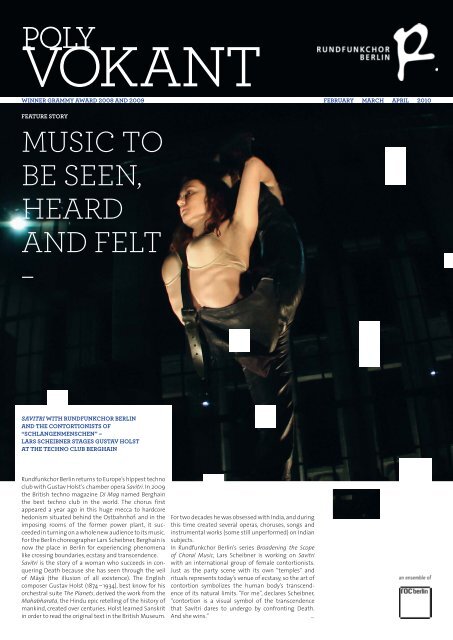
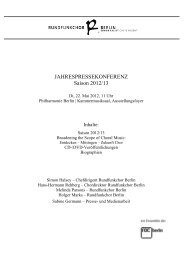
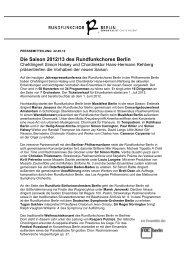
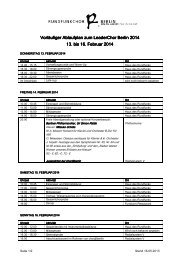
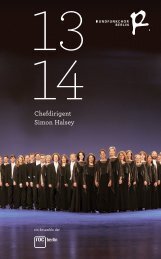
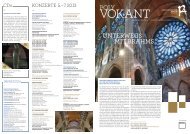
![Blckli ]•i 9\ic`e% K€^c`Z - Rundfunkchor Berlin](https://img.yumpu.com/6871683/1/190x135/blckli-oi-9ice-keurcz-rundfunkchor-berlin.jpg?quality=85)